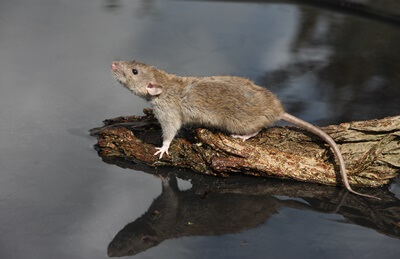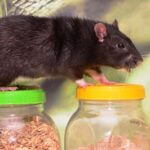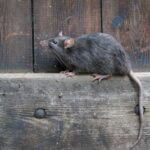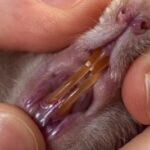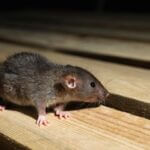Rats are nocturnal rodents, which means they’re more active at night. They rarely appear during the day unless they are starving and scavenging for food.
If you have an infestation in your home, you may not realize it until night falls when rats start screaming and making noise as they go about their lives.
A rat may scream when cornered by an enemy, especially if it has high testosterone levels.
Young rats without social skills may scream when encountering strangers in their colony. Screaming can also occur if the rat is badly hurt or injured after a fight with another rat.
If you have rats, you’ll likely hear noises in the basement, ceiling, crawlspace, and walls at night. Knowing how rats scream lets you identify their hiding spots and introduce pest control measures.
Let’s explore the reasons why rats scream and what they mean.
Do Rats Make Screaming Noises?
Rats make screaming noises in different situations to convey their feelings.
For instance, when a rat is vulnerable and feels trapped, it squeals to warn others of impending danger. Other rats, hearing the distress call, become anxious, panic, and flee from the area.
According to the University of Southern California, rats may scream due to heightened aggression caused by high testosterone levels.
Aggressive rats usually respond to the situation by hissing rather than squealing. However, they’ll sometimes scream if they fear their perceived opponent.
What Does It Mean When A Rat Screams?
Rats scream out of fear, pain, or distress.
They’re generally quiet animals that communicate using high-pitched sounds not audible to the human ear. If you hear a rat screaming or squealing, something is irrefutably wrong.
A rat that feels trapped will scream as a sign of fear. The scream responds to the vulnerable situation the rat finds itself in. It also acts as a warning to other rats in the area of looming danger. When other rats in the colony hear the call of distress, they’ll panic and scamper for safety.
Rats scream when hurt during a fight. The pain incurred may be unbearable for the rat, and the only way to make its feelings known is by crying out.
Screaming may be a way of protesting extreme bullying from other rats. Younger rats may squeal out of fear when they encounter older rats since they have yet to develop social skills.
According to the University of Iowa, infant rats scream and emit distress vocalizations when displaced from their home environments. This means a baby rat will likely cry if it finds itself in unfamiliar territory.
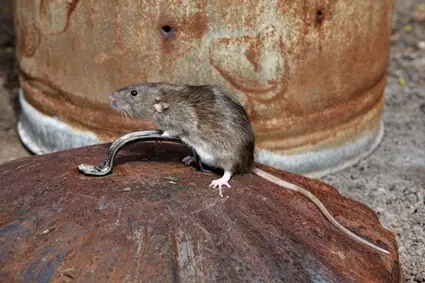
Why Do Rats Scream At Night?
Rats scream at night when fighting for food, in distress, or encountering a predator. They may also squeal at night when trapped and don’t know how to save themselves.
Rats screaming at night isn’t anything unusual. After all, rats are nocturnal animals, meaning they’re more active at night than during the day. You’re likely to hear rats squeaking and crying in the dead of the night when everyone is asleep.
Screams from rats at night are usually the result of food battles. Several rats may scream as a sign of protest over missing out on a meal. They may also cry out when trapped in a catch-and-release trap. A confined rat will scream out of fear or if it wants to warn other rats.
Because of the subdued noise, rats can be heard screaming at night. Daytime is usually noisy, and it’s almost impossible to hear the high-pitched sounds rats emit.
Do Rats Scream When They Die?
Rats may scream when dying, but it depends on how they’re dying and what is killing them.
For instance, a trapped rat may shriek out of panic as it tries to free itself from the trap. Eventually, the rat will die due to thirst and starvation.
The only other time a rat might scream when dying is if it’s hurt. The pain from its injuries might be unbearable, and the rat may produce sounds and make noises as a sign of distress.
Rats trapped with snap traps don’t scream when dying since these traps kill pest rats instantly. The rat won’t have time to conceive what has hit it since snap traps work by hitting the head and breaking the neck, causing instant death.
If the rat is dying from natural causes or disease, it doesn’t have to scream or make any noises. The process is gradual, and the rat may be too weak to vocalize.
However, the dying rat might produce high-pitched sounds that only other rats can hear.
Do Rats Scream When Poisoned?
Rats might scream when poisoned, depending on the poison consumed.
Some rat poisons work by causing internal bleeding and hemorrhage, which can be painful. The poison will overwhelm the rat, and it may squeal and make noises in response to the pain.
Conversely, other rodent poisons work by dehydrating the rat, causing it to become weak and lethargic. These poisons contain anticoagulants, which cause dehydration and make the rat thirsty.
Over time, the rat will be too frail to make noises and eventually die without screaming.
Do Rats Scream When Hurt?
Rats scream when physically hurt. The pain from their injuries might be too much for them to endure. One of the ways they respond to their predicament is by screaming.
However, rats are agile creatures, and they rarely get hurt. A rat can fall from more than 50 feet high without getting injured.
Then again, rats seek to conceal their pain because they’re prey animals. So, it’s uncommon to hear rats screaming when physically hurt lest they attract the attention of predators.
How Loud Do Rats Scream?
The scream of a rat is between 2,000 Hz and 4,000 Hz. Sounds within this frequency range are audible to humans, so you can hear rats squeaking and squealing.
Rats communicate by producing high-pitched ultrasonic sounds that are inaudible to humans. Because of the surrounding noises, you may not hear rats screaming during the day.
Do Rats Scream When Angry?
Rats normally hiss when angry or upset, using this vocalization to express their emotions and react to different situations. An angry rat will puff out its fur, hiss to show displeasure, become aggressive, or turn angrily against other rats in its colony.
According to Neuroscience Letters, high aggression in rats is associated with elevated stress and apprehension. As mentioned, rats react to fear and anxiety by screaming and squealing.

